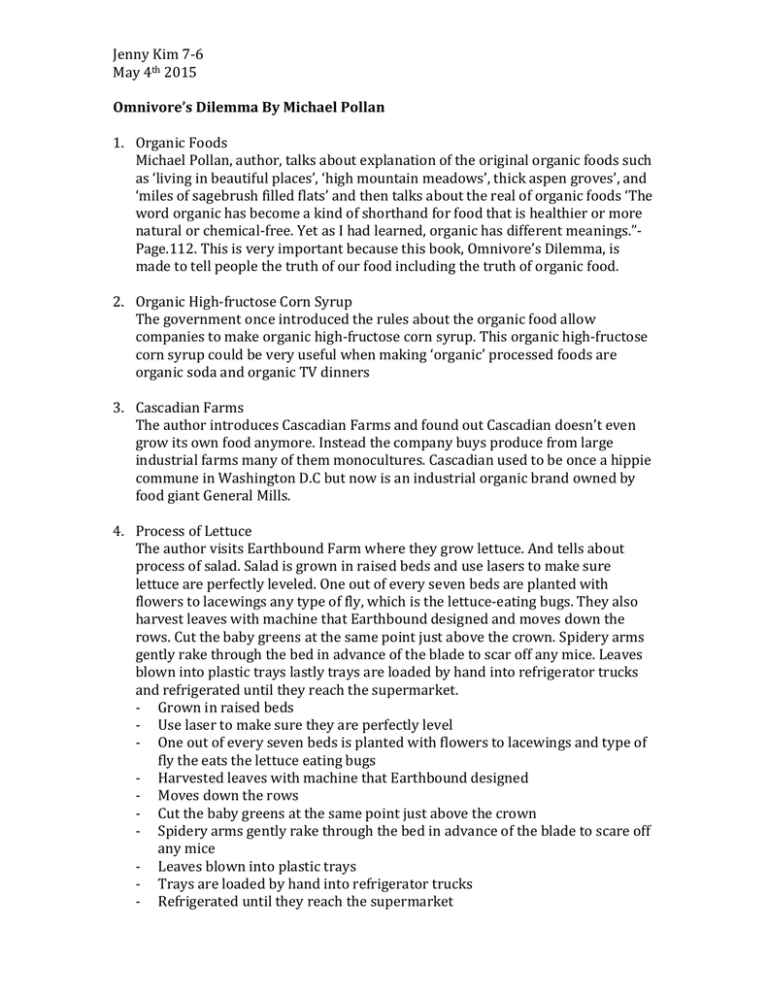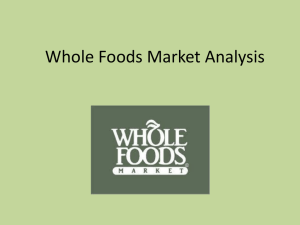Omnivore's Dilemma By Michael Pollan 10 Point Plot
advertisement

Jenny Kim 7-6 May 4th 2015 Omnivore’s Dilemma By Michael Pollan 1. Organic Foods Michael Pollan, author, talks about explanation of the original organic foods such as ‘living in beautiful places’, ‘high mountain meadows’, thick aspen groves’, and ‘miles of sagebrush filled flats’ and then talks about the real of organic foods ‘The word organic has become a kind of shorthand for food that is healthier or more natural or chemical-free. Yet as I had learned, organic has different meanings.”Page.112. This is very important because this book, Omnivore’s Dilemma, is made to tell people the truth of our food including the truth of organic food. 2. Organic High-fructose Corn Syrup The government once introduced the rules about the organic food allow companies to make organic high-fructose corn syrup. This organic high-fructose corn syrup could be very useful when making ‘organic’ processed foods are organic soda and organic TV dinners 3. Cascadian Farms The author introduces Cascadian Farms and found out Cascadian doesn’t even grow its own food anymore. Instead the company buys produce from large industrial farms many of them monocultures. Cascadian used to be once a hippie commune in Washington D.C but now is an industrial organic brand owned by food giant General Mills. 4. Process of Lettuce The author visits Earthbound Farm where they grow lettuce. And tells about process of salad. Salad is grown in raised beds and use lasers to make sure lettuce are perfectly leveled. One out of every seven beds are planted with flowers to lacewings any type of fly, which is the lettuce-eating bugs. They also harvest leaves with machine that Earthbound designed and moves down the rows. Cut the baby greens at the same point just above the crown. Spidery arms gently rake through the bed in advance of the blade to scar off any mice. Leaves blown into plastic trays lastly trays are loaded by hand into refrigerator trucks and refrigerated until they reach the supermarket. - Grown in raised beds - Use laser to make sure they are perfectly level - One out of every seven beds is planted with flowers to lacewings and type of fly the eats the lettuce eating bugs - Harvested leaves with machine that Earthbound designed - Moves down the rows - Cut the baby greens at the same point just above the crown - Spidery arms gently rake through the bed in advance of the blade to scare off any mice - Leaves blown into plastic trays - Trays are loaded by hand into refrigerator trucks - Refrigerated until they reach the supermarket Jenny Kim 7-6 May 4th 2015 5. Chicken Rosie Chicken Rosie was mentioned chapter 10 but chapter 11 contain more information about Rosie. Rosie is free-range organic chicken at her farm in Petaluma. Rosie can freely range outside but Rosie lives in a shed with twenty thousand other Rosie. The little door in each shed leading out to a narrow grassy yard is open at least five weeks after the birth of Rosie. By the time they are so used to the shed that none of them go outside. Cornish Cross broilers are where all the Rosie and other chickens raised at Petaluma are born. Cornish Cross is fastest growing chicken ever, turning corn into meat faster than any other bird. They go from egg to full size in just seven weeks. In fact the birds grow so rapidly that their bones cannot keep up. 6. Importing Foods Around the World. - Blueberries from Canada - Garlic from China - Oranges from Australia and South Africa - Apples from New Zealand and Chile - Tomatoes from Mexico - Pears from Argentina -About 35% of the fruit and nuts and 15% of the vegetables consumed in the US are imported 7. Author’s meal The author started making his own meal, the materials are from the farm he visited during the two chapter. He also talks about how the food tastes like taste like and the process he the food. He also talks about the price of the organic foods and how much it coasted him to make it. 8. Is Organic Better for You? Organic factory farm chickens live only slightly better lives than non-organic factory chickens. An organic label does not guarantee that cattle have spent any time in a real pasture. The original organic food movement thought organic farming should be sustainable. It means it should be as much as possible. Industrial organic food chain is anything but a closed renewable loop. The food in our organic meal had floated to us on a sea of petroleum just as surely as the corn-based meal we’d had in McDonald’s. 9. Is It Health Food? Does organic food contain more nutrients, vitamins, minerals, and natural substances, which your body need? As far as the USDA is concerned all carrots are created equal organic and non-organic. In 2003 one University of California researchers studied two crops of corn, strawberries and black berries. The plants were identical and grown in side-by-side plots. One set of the plants was grown using organic methods and other set was grown conventionally with chemical fertilizer, pesticides and herbicides. The resort was organic fruit and Jenny Kim 7-6 May 4th 2015 vegetables contained higher levels of vitamin C also had wider range of natural chemicals called polyphenols. Polyphenols are group of chemicals made by plants that seem to play an important role in human health. 10. New Food Chain In America At the last the author found out new food chain in America. These farms aren’t owned by big agribusiness corporations. They don’t ship their vegetables and meat across the country or across the globe. So the author told him about his book. He decides to find out more about this farm and how different an organic farm could be.



